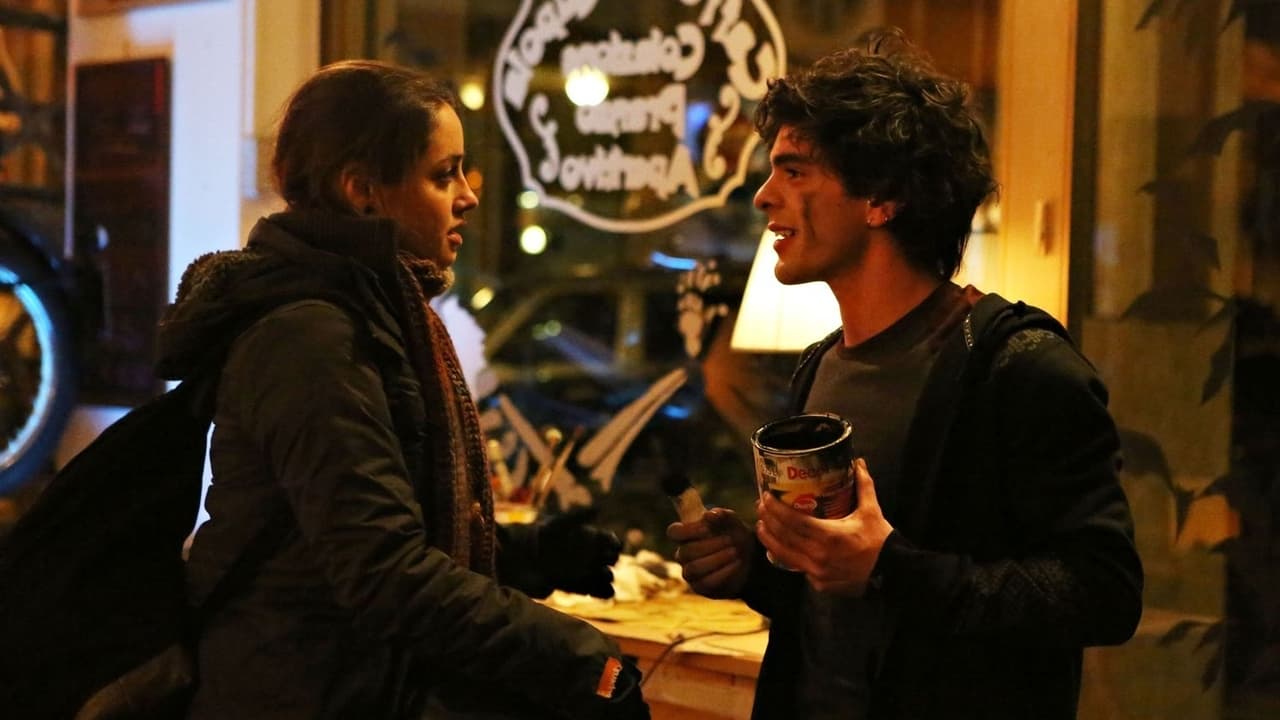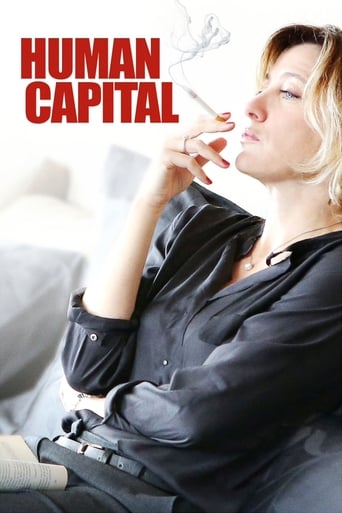

disgusting, overrated, pointless
... View MoreBad Acting and worse Bad Screenplay
... View MoreA clunky actioner with a handful of cool moments.
... View MoreThis is a small, humorous movie in some ways, but it has a huge heart. What a nice experience.
... View MoreThis movie met if not exceeded my expectations before watching this eventful film. I was not aware there was a novel until reading previous comments, and I will make sure to look for this novel as the books always tend to be just a tad better. The actors played their parts rather marvelous! Each character had their own struggles going on, besides the main battle of the movie. By the end of the movie you just felt sorry for some and their way of being/what struggles they were going through. The whole plot was divided into chapters from different characters' perspectives which helped the viewer understand more what is going on in each characters' lives (there is a lot). And so because of this you were more in touch with their emotions. It was amazing how there may have been multiple perspectives on the main incident that brings this movie together, however, they all connect just perfectly. Each of the characters which we see input on has a great internal struggle going on, which helps the plot become so much more dramatic and amazing! Hands down would watch this again, and I definitely recommend it to anyone who loves a good eventful, dramatic, and changing of a character type of movie!
... View MoreGreetings again from the darkness. The financial crisis-manslaughter-class warfare-thriller from novelist Stephen Amidon shifts from Connecticut (in the book) to just outside of Milan for director Paolo Verzi's look at class and character. A term used by insurance companies to calculate the value of a human life in settlement cases, "human capital" carries even more meaning in this twisted tale of greed and broken dreams.After an opening sequence that shows an off-duty waiter getting knocked from his bicycle by a swerving SUV in the dark of night, the story is divided into chapters that provide the various perspectives of different characters affected by this hit-and-run. Dino (Fabrizio Bentivoglio) is a middle-class real estate business owner whose girlfriend (the too rarely seen Valeria Golino) is pregnant with twins, and his daughter Serena (Matilde Gioli) is dating a private school classmate Massimiliano (Guglielmo Pinelli) who comes from the upper crest Bernaschi family that is living the dream thanks to the dad's (Fabrizio Gifuni) hedge-fund success.It's easy to see how the lives of these two families become intertwined, and how a few other characters are also affected, but the real joy here is in getting to know each through their own actions. Dino desperately wants a taste of the finer things in life, and risks everything by fraudulently obtaining a bank loan in order to buy into Bernaschi's hedge fund. His wife Roberta is a trusting and pure-hearted woman who accepts her place in society and warmly looks forward to being a new mom. Their daughter Serena proves to be the best judge of character and soon enough boots the spoiled kid Massimiliano to the curb, while connecting with the artistic and misunderstood Luca (Giovanni Anzaldo), though even Serena's moral compass shows its cracks.Bernaschi is a smooth operator and the perfect face for a hedge fund so dependent on the financial collapse of its own country. His wife Carla (Valeria Bruni Tedeschi) is a lost soul enjoying the perks of a wealthy lifestyle, but still holding on to her artistic dreams of youth. Life as a trophy wife is evidently not so fulfilling for those with their own aspirations. Their son Massimiliano, as you might imagine, is unable to live up to the expectations of his father, and frequently handles his perceived lack of parental attention by over-boozing at every opportunity.This film was Italy's submission to the Academy in the Best Foreign Language category, but unfortunately did not make the final cut. It is rich in texture and remarkable in its ability to convey depth in so many characters. The basic story has some similarities to the film 21 Grams, in that we witness the many ways in which people handle crisis. In this case, the mystery of the initial sequence is left unsolved until near the end, but there are so many personal "fork in the road" moments, that solving the case of the cyclist death somehow doesn't monopolize our thoughts.Excellent acting throughout allows us to connect with each of the key characters, and especially worth noting are Valeria Bruni Tedeschi and Matilde Gioli. Ms. Gioli is a newcomer with a bright future. She brings believability and strength to a teenager role that would more typically be over-the-top or one-dimensional in the hands of a lesser actress. Even more impressive is the performance from Ms. Bruni Tedeschi who perfectly captures the heartbreak of a woman living a life others can only dream about, while her own dreams are but shadows from the past.With source material from a U.S. novelist, and subject matter involving the 1% and crisis of conscience, it's not difficult to imagine an American remake, but this version is highly recommended for those who enjoy a multi-faceted dramatic thriller.
... View MoreIn the closing moments of this intricate drama, "Human capital" is defined as an insurance industry term, referring to the way damages payouts are calculated upon death, partly dependent on the individual's "emotional bonds". But the phrase more broadly refers to the way that the productivity and creativity of people can be converted into economic value. These definitions tell us everything we need to know about the themes at hand in Paolo Virzì's deconstruction of the Italian upper middle.Human Capital is Italy's entry for next year's Academy Awards, and it's not hard to see why. It's a handsome, solid, complex, character-driven drama with an already award-winning performance from Valeria Bruni Tedeschi at its centre. She plays Carla Bernaschi, the wife of a businessman on the cusp of ruin. She persuades him to buy her a crumbling theatre – a pet project – as a gift. But it quickly becomes apparent that the theatre isn't economically viable. It'll have to be converted into flats instead.The film is full of such soul-crushing moments. One needn't look far for metaphors. The various subplots revolve around a car crash (The Crash), and the fallout which threatens to ruin those at the bottom of the social ladder, leaving those at the top untainted. One needn't, also, look far for comparisons: Paul Haggis's award-friendly Crash, and the work of Alejandro Iñárritu, in the way that chronologically concurrent stories are shown one after another.But Virzì's film is less aggravatingly worthy than the work of Haggis and less laborious than Iñárritu's English-language work. Indeed, the first of four "chapters" plays out with wicked dry humour, as Dino Ossola (Fabrizio Bentivoglio) desperately claws at the deal of a lifetime in order to break into the business elite. He's trying to seduce that wretched husband of Carla's, Giovanni (Fabrizio Gigfuni), but he only recognises the capital, not the humanity. It leaves Carla bereft; searching for meaning and affection. Meanwhile, both the Ossolas and the Bernaschis are bound by their kids. Serena Ossola (Matilde Gioli, resembling a younger Eva Green) knows something about the car crash, and the cost of keeping or revealing the secret is where the real meaning of the film's title will become known.Virzì's style starts out dead pretty; all fairy tale lighting and wintry wonderlands, mirroring the illusory worlds the wealthy (or would-be-wealthy) inhabit. But as the cost of these characters' decisions become known, the camera leaves the tripod and the style gets grittier. Virzì is clearly aware of the inherent humour and horror in seeing the same events from multiple perspectives. While comedy gives way to tragedy, the twists and turns don't feel manipulative, and ultimately this is a story imbued with hope. In part this is due to the villain of the piece – the apparently heartless Giovanni – never being reduced to a mere monster.The structure does mean that at times the chronology of events becomes muddled. It's not always completely clear how much time is supposed to have passed between scenes, leading to some false impressions of certain relationships. And, inevitably for such a tightly woven story, narrative contrivance and convenience is never far away. But then, what does one expect from a morality play? And a thoroughly modern one at that. This is an intelligent, accessible film, wise to focus on the most interesting characters in the room: those on the margins; those with most to lose. A fine contender.
... View MoreWhen it comes to go to the cinema I am always hesitant, I prefer to go on my own and I am OCD about the location, the seat and the quality of the projection. Anyway there still is a bunch of directors who is able to drag me to an actual cinema and Paolo Virzì will always be a member of this inner circle. The Human Capital based on an American book and transposed into a chilly Lombardy. Two families the first bourgeois and the latter loaded raiding the present economy are linked by their teenager children and by a terrible accident that could change their life. The film is split in four chapter (three named after the lead character and the fourth which is recapitulatory and conclusive), and this narrative technique is old and overindulged, but I understand the choice made in order to play up the thriller side of the film. As for the "something new", I loved this new setting, Virzì for his first time has gone north exploring the phony world of private school, party and high finance, avoiding triteness with his choice to shoot in Brianza. An honourable mention goes to the cast and especially to Gifuni, Bentivoglio and Bruni Tedeschi. Here we come to "Something borrowed", without being pedantic Virzì draws fully from the experience of Elio Petri(Investigation of a Citizen Above Suspicion), Luchino Visconti(Conversation Piece, The Damned) and Tonino Cervi(Portrait of a Bourgeois in Black) without forgetting his origins as a comedy writer interested mostly by the south side of Italy ( Ferie d'Agosto, Ovosodo etc...). And finally "something blue", looking back to Virzì's previous production the depression has always been a main theme. In the Human Capital Valeria Bruni Tedeschi is clearly clinically depressed, she lives in a golden cage, killing her time in futile occupation to fulfill her substantial lack of joy, with her big blue eyes and her hoarse voice Bruni Tedeschi really nailed her role, and spiced up a film which wasn't able to totally get me but I still cannot define a bad film.
... View More